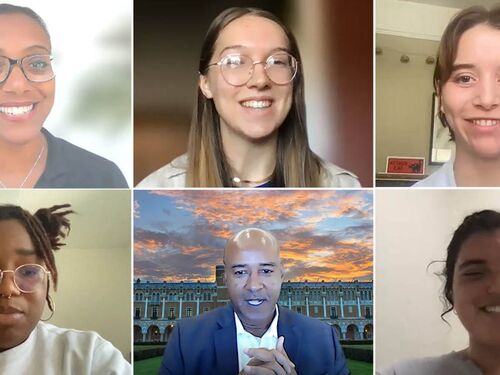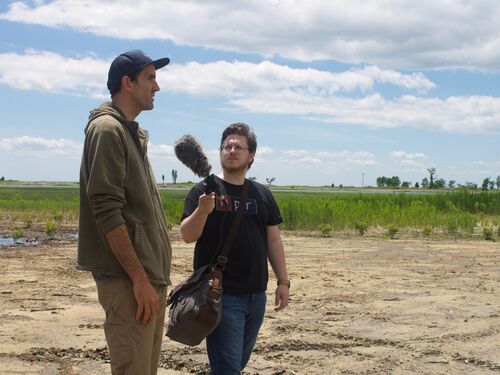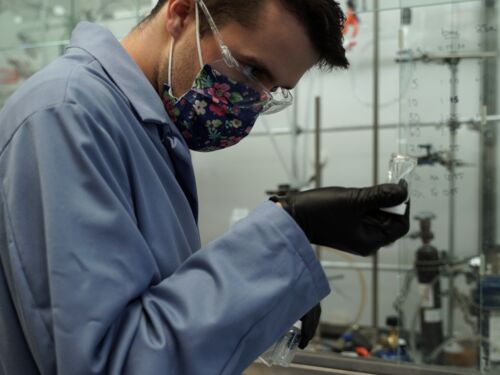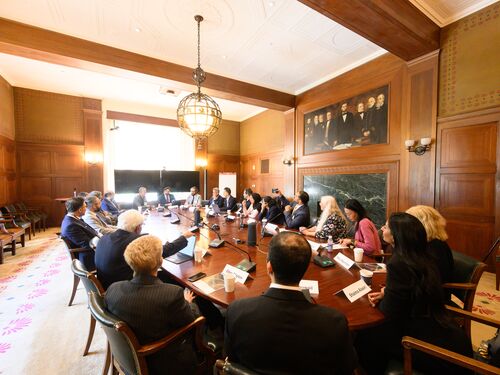Participants in the Gulf Scholars Program Gather for the First Time to Share Ideas and Make Connections
Feature Story
By Maeghan Klinker
Last update November 16, 2022

Nearly 100 students, faculty, and other experts recently gathered online for the first-ever Fall Forum of the Gulf Scholars Program (GSP) — a five-year, $12.7 million pilot program of the National Academies’ Gulf Research Program aimed at preparing undergraduate students to address pressing environmental, health, energy, and infrastructure challenges in the Gulf of Mexico region. The virtual forum was the first opportunity for faculty and students from the participating institutions to gather and discuss their work.
“We cannot overstate the need that we have for the next generation, the youthful generation, to bring your energy, your creativity, your facile thinking, your digital nativity, and your urgency to these [issues facing the Gulf region],” said Gulf Research Program Executive Director Lauren Alexander Augustine in welcoming remarks.
Much of the conversation during the forum focused on the GSP’s Gulf Impact Project, which requires students to complete a major research or creative project that integrates and applies what they’ve learned for the benefit of the Gulf region. A key component of the GSP, these projects allow students to collaborate with a Gulf region partner or community and bring knowledge to action.
“These partnerships are really the heart and soul of these projects,” said Jaiden Hatch, a senior studying public health with a concentration in environmental health sciences at the University of Alabama at Birmingham. “Through this program, I’ve connected with local organizations that all act as an extension of the community, and then also connected with professors who taught at higher academic institutions in the region. I’ve really learned a lot from them, and I hope to continue learning from them.”
The topics and scope of the Gulf Impact Projects varied widely. For instance, Hatch’s project involves using community asset mapping to learn more about attitudes toward the Cahaba River in the Black Belt region of Alabama. Community members answer questions such as, “can the Cahaba River be used as a tool for economic and social empowerment in the Black Belt?” and “can increasing a community’s value, appreciation, and pride in a natural resource, such as the Cahaba River, increase overall community development and health?” Hatch’s impact project will culminate in a report of her findings that she will share with various community members and organizations.
Tulane University senior Claire Keckley, an environmental studies major, is analyzing the effectiveness of community outreach and engagement in relation to the development of the Louisiana Comprehensive Master Plan for a Sustainable Coast. As part of this project, she is interviewing people who have attended community meetings, focus group members, activists, members of the Coastal Protection Resource Authority (CPRA), and representatives of nonprofits involved in CPRA’s outreach and engagement efforts. Keckley’s funding through the GSP allows her to compensate the people who she interviews for their time and covers transcription services, which allows her to focus more on her research.
“I feel like we had a very interesting variety of topics that made it clear to me how diverse and how large a spectrum there is for issues in the [Gulf] Coast,” said Afia Boaitey, a sophomore studying neuroscience at Xavier University. She described participating in a workshop on navigating databases.
For many of the faculty and staff in attendance, the enthusiasm and passion the students displayed was invigorating. “I’m really excited and energized by these projects, and the work that’s being done by these scholars in the classroom to learn more about the challenges facing the Gulf of Mexico, how they impact people living nearby and far [away], and how to mitigate such issues,” said Reginald DesRoches, president of Rice University.
Students and faculty were also provided with opportunities to engage with students across cohorts and universities and share ideas. Similarly, faculty were able to discuss challenges and solutions among their own programs to aid each other across institutions.
“[The forum] is a testament to the power of connecting with people, and seeing what everybody is doing,” said Valentina Osorio, a junior studying chemistry and earth, environmental, and planetary sciences at Rice University. “I think all the ideas shared here about sustaining these connections is really vital.”
Related Resources
More like this
Discover
Events
Right Now & Next Up
Stay in the loop with can’t-miss sessions, live events, and activities happening over the next two days.
NAS Building Guided Tours Available!
Participate in a one-hour guided tour of the historic National Academy of Sciences building, highlighting its distinctive architecture, renowned artwork, and the intersection of art, science, and culture.




